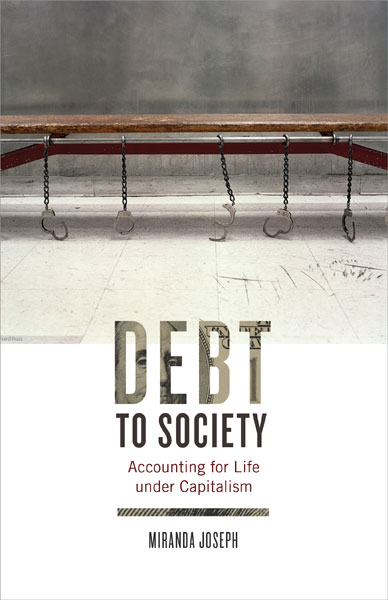How do credit, debt, and accounting shape our lives?
We often hear that criminals pay their debt to society by spending time in prison, but what is a “debt to society”? How is crime understood as a debt? How has time become the equivalent for crime? And how does criminal debt relate to the kind of debt held by consumers and university students?
In Debt to Society: Accounting for Life under Capitalism (University of Minnesota Press, 2014), Miranda Joseph explores modes of accounting as they are used to create, sustain, or transform social relations. Envisioning accounting broadly to include financial accounting, managerial accounting of costs and performance, and the calculation of “debts to society” owed by criminals, Joseph argues that accounting technologies have a powerful effect on social dynamics by attributing credits and debts. From sovereign bonds and securitized credit card debt to student debt and mortgages, debt and accounting structure our lives.
Exploring central components of neoliberalism (and its crisis) from incarceration to personal finance and university management, Debt to Society exposes the uneven distribution of accountability within our society. Joseph demonstrates how ubiquitous the forces of accounting have become in shaping all aspects of our lives, proposing that we appropriate accounting and offer alternative accounts to turn the present toward a more widely shared well-being.
Get the Book
Table of Contents:
- Introduction: Modes of Accounting
- Chapter 1: Accounting for Debt: Toward a Methodology of Critical Abstraction
- Chapter 2: Accounting for Justice: Beyond Liberal Calculations of Debt and Crime
- Chapter 3: Accounting for Time: The Entrepreneurial Subject in Crisis
- Chapter 4: Accounting for Gender: Norms and Pathologies of Personal Finance
- Chapter 5: Accounting for Interdisciplinarity: Contesting Value in the Academy
- Acknowledgments
- Notes
- Bibliography
- Index
What People Are Saying About Debt to Society
“Debt to Society provides an innovative and ambitious scholarly intervention across a wide swath of fields, with much fresh thinking and provocative reframing in every one. Miranda Joseph analyzes the diverse and conflicted neoliberal norm of entrepreneurial subjectivity, searching for and illuminating its possible breaking points.”
— Lisa Duggan, author of The Twilight of Equality? and professor of Social and Cultural Analysis at New York University
“I’ve been distressed by the increasing focus on debt as a central instrument of social control. Miranda Joseph offers a much richer reading of how debt is embedded in a larger system of social control via accounting. But this is no screed against accounting—it is instead a guide to thinking about how we use statistics and other forms of abstraction, and how we might rethink the practice to produce a better world. I learned a lot from it.”
— Doug Henwood, editor of Left Business Observer and contributor at The Nation
“Joseph’s critique of the disciplinary force of accounting practices is an insightful and compelling discussion of heretofore neglected aspects of neoliberalism.”
— American Studies Journal
“One of the many strengths of Joseph’s book is the artful and considered way in which she weaves her own experiences—as a researcher, university administrator, home-owner and citizen—into her theoretical analyses.”
— A Year’s Work in Critical and Cultural Theory
About the Author
 Miranda Joseph is Professor of Gender & Women’s Studies at the University of Arizona and affiliated faculty in the School of Geography and Development.
Miranda Joseph is Professor of Gender & Women’s Studies at the University of Arizona and affiliated faculty in the School of Geography and Development.
She is the author of Debt to Society: Accounting for Life Under Capitalism (University of Minnesota Press, 2014), which explores modes of accounting as they are used to create, sustain, or transform social relations, and Against the Romance of Community (University of Minnesota Press, 2002), which examines the supplementary relation of community with capitalism in the context of political debates over LGBT art and culture and the discourses and practices of NGOs.


You must be logged in to post a comment.